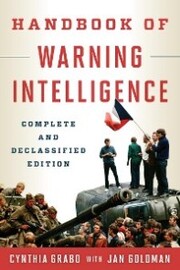Detailansicht
Handbook of Warning Intelligence
eBook - Security and Professional Intelligence Education Series
ISBN/EAN: 9781442248144
Umbreit-Nr.: 2136120
Sprache:
Englisch
Umfang: 454 S.
Format in cm:
Einband:
Keine Angabe
Erschienen am 09.09.2015
Auflage: 1/2015
E-Book
Format: EPUB
DRM: Adobe DRM
- Zusatztext
- <span><span>This new and final edition is a follow-up to the authors first book,</span><span>Anticipating Surprise</span><span> (University Press of America, 2002) and the</span><span>Handbook of Warning Intelligence</span><span> (Scarecrow Press, 2010). The first book was an abridged version of Grabos 1972 manuscript, of which only 200 pages were allowed to be published by the government. The second book was published after it was agreed that the last 10 chapters would remain classified. These final 10 chapters have recently been released by the government and complete the manuscript as it was originally intended to be published by the author in 1972.<br><br></span><span>The Handbook of Warning Intelligence</span><span> was written during the cold war and was classified for 40 years. Originally written as a manual for training intelligence analysts, it explains the fundamentals of intelligence analysis and forecasting, discusses military analysis, as well as the difficulties in understanding political, civil, and economic analysis and assessing what it means for analysts to have "warning judgment."<br><br>Much of what Grabo wrote in her book seems to appear in many of the numerous commission reports that emerged after the 9/11 attacks. However, her book was written in response to the "surprise attack" of the Soviet Union's invasion of Czechoslovakia in 1968. According to the author, that event was no surprise. And while analysts have to take some of the blame for their failure to strenuously present their case that the threat was real and imminent, what occurred was a failure by policymakers to listen to the warning intelligence reports that were written at the time.<br><br>In these last chapters, Grabo discusses scenarios where the United States will need to take action, especially describing Soviet indicators of such action. She also talks on how to influence policymakers to take, or not take, action based on intelligence. After the Soviet Union fell, the government was hesitant to release this informationespecially considering what's going on with Putin today.<br></span></span>
- Kurztext
- <span><span>The Handbook was written during the cold war and was classified for 40 years. Originally written as a manual for training intelligence analysts, it explains the fundamentals of intelligence analysis and forecasting, discusses military analysis, as well as the difficulties in understanding political, civil, and economic analysis and assessing what it means for analysts to have "warning judgment." This new edition includes the final ten chapters recently released by the government. This is the manuscript as it was originally intended to be published by the author in 1972. </span></span>
- Autorenportrait
- <span><span>Cynthia Grabo</span><span> received her bachelor's and master's degrees from the University of Chicago. In 1942, she was recruited by Army Intelligence as an analyst on Latin America. In 1949, she transferred to the Soviet branch and was assigned to analysis of Communist military threats. From 1950 to 1975, she was a researcher and writer for the U.S. Watch Committee, the inter-agency intelligence committee responsible for warning of threats to the U.S. and its allies. She subsequently served on the Intelligence Community's Strategic Warning Staff. Ms. Grabo was a recognized authority in the field of strategic warning. Her awards included the Defense Intelligence Agency's Exceptional Civilian Service Medal, the Sherman Kent award for outstanding contribution to the literature of intelligence, and the National Intelligence Medal of Achievement.</span></span><br><span></span><br><span><span>Jan Goldman</span><span>is Professor of Intelligence and National Security Studies at Tiffin University. He has been an analyst and educator in the intelligence and academic communities for over 30 years. He is the founding editor of a series of textbooks for the intelligence profession, Security Professionals Intelligence Education SeriesSPIES (Rowman and Littlefield Publishers), and an academic journal focusing on ethics and intelligence. His most recent publications include War on Terror Encyclopedia: From the Rise of Al Qaeda to 9/11 and Beyond, and The Central Intelligence Agency: An Encyclopedia of Covert Operations, Intelligence Gathering, and Spies. He received his doctorate from George Washington University.<br><br></span></span>
